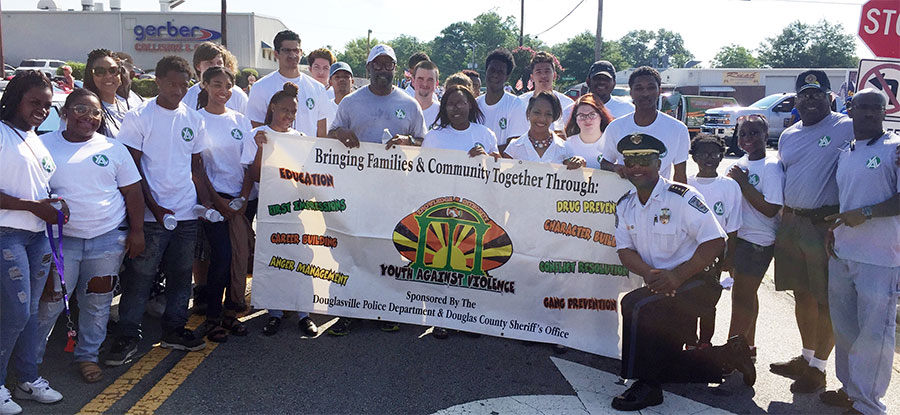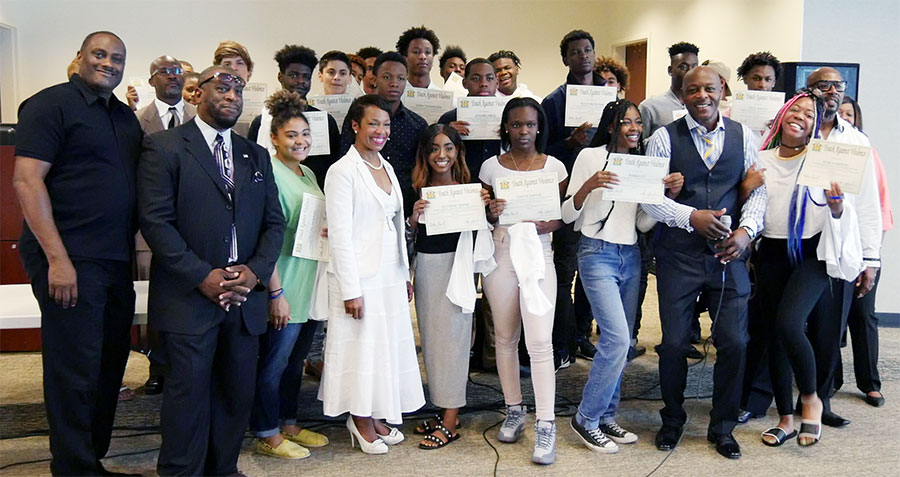Engaging Youth in Douglasville: Providing an Alternative to Gangs
Print This Post

Douglasville Mayor Rochelle Robinson and Police Chief Gary Sparks with participants of the Youth Against Violence Program. Photo courtesy of the City of Douglasville
Innovative program educates youth on the dangers of joining gangs and gives them tools for a better life.
by Sara Baxter
Back in 2008, when Gary Sparks was deputy chief of the Douglasville Police Department, he started to see an increase in young people getting into trouble. They were fighting in schools and the community. They were committing crimes. Gangs were forming.
“We realized we needed a remedy—something for these kids to do,” said Sparks, who joined Douglasville’s police force in 1987 and became police chief in 2015. “If you remove something negative, you have to replace it with something positive.”
That “something positive” is the Youth Against Violence program that Sparks created in the summer of 2008 to help educate at-risk youth on the disadvantages of gangs and making positive life choices.
He gathered the first class of students and asked them: “What’s one thing you want to change in your life?” Participants wrote answers on a sheet of paper such as “have a better relationship with my parents” and “get better grades” and “get out of the gang.” He gathered the slips of paper and, along with Lt. Ken Winklepleck, developed a course curriculum based on those issues that teaches kids life skills, anger management, conflict resolution, goal setting, and good decision-making skills. They also cover gang violence and prevention, drug prevention and an overview of the law.
“We try to turn on the light bulb and teach them how to make better choices,” said Sparks. “In eight weeks, we give them all the tools they need to be successful citizens.”
Since that first class, Sparks estimates nearly 4,000 kids—males and females ages 14-19 – have graduated from the program. It costs about $20,000 a year for materials, speakers, and lunches that are provided during each class. Sparks says the majority of the funding comes from confiscated funds from drug dealers. Each session lasts eight weeks and is held every Saturday from 10 am to 12 pm. Guest speakers such as city officials, judges, lawyers, local business owners and even former gang members and past participants have shared their knowledge and experience with the participants.
“I want them to know that if you join a gang, or exhibit criminal behavior, these are the consequences you will face,” he said. “I want to tap into their greatness and teach them that they have to unlock it if they want to be successful.”
Not only have the young people of Douglasville benefited from the program, but so has the city. Sparks says that since the program was started, there has been a decrease in gang activity, crime has gone down, and graffiti—a hallmark of gangs—around the city has been reduced.
“We’ve saved a lot of lives and made Douglasville a safer place to live,” said Sparks. “Things have definitely improved.”
He credits Douglasville city government for their support as well.
“The mayor and Council have played an important role in the success of the program by budgeting funds each year to support it,” said Sparks. “In addition, they come by and participate in the program on occasion.”
The other thing the program has done is to instill a mutual respect for the youth and the police, softening the “us vs. them” mentality. In fact, when the program first started, Sparks had officers providing rides to and from the class to youth who needed transportation. Officers are also a common fixture in the class.
It changed the perspective of Matthew Saffo, who attended the first class in 2008 when he was 14 years old.
“It gave me a better understanding of the way things work,” said Saffo. “It taught me not to be afraid of the system and trust in the police. It helps create bonds you wouldn’t usually have and bridges the gap between us vs. them.”
Saffo, now 27, describes himself as a “good kid” when he joined the first class that summer, but he acknowledges that it probably helped him stay out of trouble.
“It did shape me,” he said. “It taught me to never be ashamed to say ‘no’ and to not let people put me in a compromising position. I’ve also seen how it’s changed others who’ve gone through it. It’s an amazing program.”
Participants come to the program through a variety of avenues—and it may not be by choice. Some are sent by their parents. Some come through the court system as part of their parole requirement. The school system may require they attend as part of disciplinary action.

Douglasville Mayor Rochelle Robinson and Police Chief Gary Sparks celebrate with graduates of the Youth Against Violence program. Photo courtesy of the City of Douglasville
“Youth Against Violence is a diversion program to get kids who might be going down the wrong path into other things,” said Mayor Rochelle Robinson, a frequent guest speaker at the classes. “Some kids don’t have positive role models and this is another tool in the tool box for success.”
Robinson said she believes in the importance in providing role models to all young people in Douglasville and has implemented several programs to engage the youth. She created a summer internship for college students to work in her office. Late in 2019, she launched her “Supper Club” series and began by inviting class presidents of each of the five community high schools as a way to get input from these emerging leaders in order to plan for future development. She also operates a street adoption and clean-up project twice per year—once in the fall and once in the spring. During Georgia Cities Week, she hosts second graders from each community elementary school to tour city facilities, see demonstrations from all departments, and participate in a mock City Council meeting. In December she nominates a family to serve as master of ceremonies for the holiday parade, as well as the next day during the Breakfast with Santa event.
“Youth are our future and our legacy, and it is our responsibility to invest in our young people,” says Robinson. “Society is better if we give back.”
Sparks shares that mantra, giving back in a big way: He is a regular fixture at Youth Against Violence every Saturday—48 weeks out of the year. The only times he misses is when he’s out of town. In 2015, he was honored with the International Association of Chiefs of Police (IACP) Civil Rights Award for his work on the program. He’s also been recognized by the City Council. But to him, it’s not about the awards and accolades, it’s about making a difference in the lives of the kids he serves.
“If we save one life, we’ve hit it out of the park,” says Sparks. “To me it’s a calling. Those kids are helping me just as much as they get helped. I am blessed to be there every Saturday.”
Sara Baxter is a freelance writer based in Decatur, GA. She specializes in telling stories for nonprofit organizations.
Contact:
Kelli Bennett
GMA Communications Director
678-686-6242
gacities.com/Contact/Staff/99583
Bill Valladares
GaFCP Communications Director
404-739-0043
william@gafcp.org
Follow us on Twitter: @gafcpnews
Connect with us on Facebook.
Georgia Municipal Association anticipates and influences the forces shaping Georgia’s cities and provides leadership, tools, and services that assist municipal governments in becoming more innovative, effective and responsive.
